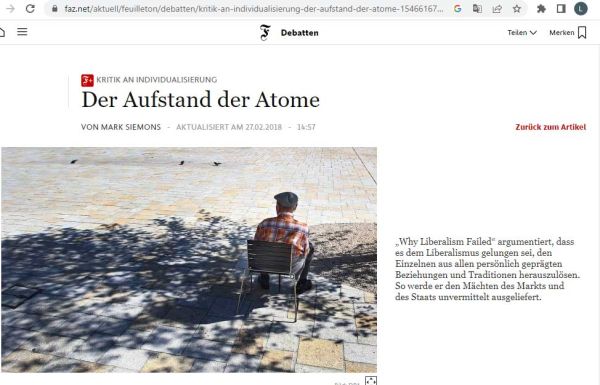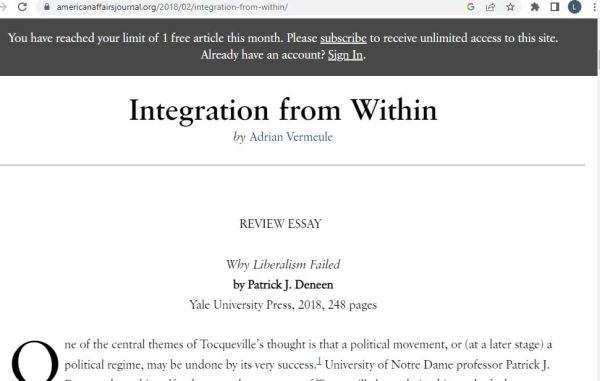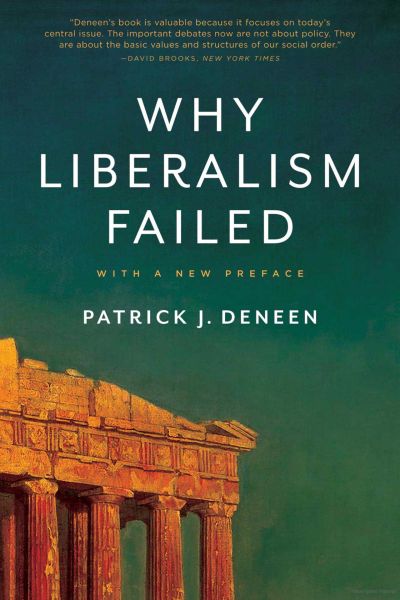Community versus Autonomy
This article appeared in the Sunday edition of the Frankfurter Allgemeine newspaper, February 25, 2018. The title, "Der Aufstand der Atome," translates to English as "The Revolt of the Atoms." The accompanying photograph shows a solitary man sitting in the shade at the edge of a city square. Like him, many Americans see themselves as atoms. The sub-titled text explains that government's intervening in the lives of citizens has superseded all other personal, local organizations, leaving Americans isolated and dependent on it.
"Der Aufstand der Atome" is basically a review of a book published in 2018 by an American academic named Patrick Deneen, titled Why Liberalism Failed. That makes this article four years old. I would have written something about it sooner, but I needed to finish a book of my own, Divide the Country, that I finally published during the Lockdown in 2020. Thanks to the Lockdown, I did not visit Germany for a year and a half.
Deneen made quite a stir in American academic circles, and presumably also for German academics, for German publications to bother with it. The author of "Der Aufstand der Atome," Mark Siemons, must have realized that Germany and America have similar problems related to an atomized society. People like the old man in the photo feel that no one will take care of them but the government. But the availability of government services leaves them peevish and uncertain. What if the government overwhelms all the lonely people--enslaves them? What if it neglects them--leaves them all alone? Classic existential angst.
As I read the commentaries and reviews for Why Liberalism Failed, I kept thinking that the author Patrick Deneen should have used the "Atome" title for his book. Trying to convince his readers that Liberalism has failed won't win him any friends, nor does it say enough about the book's intentions. For one thing, most people don't know what "Liberalism" really means. Defining liberalism does not involve fixed concepts, since its defining ideals transitioned from the 19th to the 20th century and basically changed sides, from an ideology preaching autonomy, personal initiative, personal space, and entrepreneurism, to an ideology preaching egalitarianism and socialization through government intervention in the personal affairs of its citizens.
The present disunity in our country pits 19th century Liberalism against the 20th century variety. For an ongoing 19th century Liberalism, read up on the Swiss political party FDP: die Liberalen, which has maintained its nineteenth-century roots. The leaders of the FDP only use the acronym, so I will explain the origin of it. In 2009, the Freisinnigen Demokraten (Free-thinking Democrats) merged with Die Liberalen to become the FDP. Even today, the French name for the Party is Les Libéraux-Radicaux. George Bernard Shaw published a play titled Arms and the Man about a Swiss mercenary soldier. When clueless nineteenth-century Europeans asked him about his social status in Switzerland, he replied proudly, "My rank is the highest known in Switzerland. I am a free citizen!"
In fact, the two sides of Liberalism do not have enough inclusiveness to maintain a functioning society. Trying to get past the feigned ignorance of Democrat and Republican leaders, to help them understand the futility of continuing the illusion of a United States, will test the patience of forward-thinking people, who are anxious to avoid further divisiveness.



